Response To Apology Letter
[Your Name]
[Your Address]
[City, State, Zip Code]
[Email Address]
[Phone Number]
[Date]
[Sender's Name]
[Sender's Address]
[City, State, Zip Code]
Dear [Sender's Name],
I hope this letter finds you well. I want to express my sincere gratitude for your heartfelt apology. Your willingness to acknowledge any hurt or inconvenience caused shows the strength of your character, and I truly appreciate your effort to make amends.
First and foremost, I want you to know that I accept your apology wholeheartedly. It takes courage and humility to admit one's mistakes, and I commend you for taking responsibility for your actions. As human beings, we are all prone to errors, and it's essential that we learn from our missteps and grow as individuals.
Your apology has touched me deeply, and it reassures me that you genuinely value our relationship/friendship. I want you to understand that I hold no grudges, and I believe in forgiveness as a path to healing and moving forward positively. Please know that I am ready to put this incident behind us and continue our journey together.
Communication is key in any relationship, and I'm grateful that we were able to address this matter honestly and openly. Going forward, I believe our bond will only become stronger because of this experience. Let's use it as an opportunity to foster a deeper understanding and appreciation for each other.
If there is anything you need from me or if you'd like to talk further about this, please don't hesitate to reach out. I value our connection, and I'm here to support you, just as you've supported me in the past.
Once again, thank you for your apology, and please be assured that everything is forgiven. Let's continue building beautiful memories together.
With warm regards,
[Your Name]
Professional Response Accepting Apology
Subject: Re: Your Apology
Dear [Name],
Thank you for your email and for taking the time to apologize. I appreciate your honesty and willingness to acknowledge what happened.
I accept your apology and understand that mistakes can occur in any professional environment. Your prompt response and sincere tone demonstrate your commitment to maintaining our working relationship.
Moving forward, I believe we can use this experience as an opportunity to strengthen our communication and collaboration. I'm confident that we can continue to work together effectively.
Thank you again for reaching out. I look forward to our continued partnership.
Best regards,
[Your Name]
Heartfelt Personal Response to Friend's Apology
Subject: Thank you for your apology
Hi [Friend's Name],
Your message really touched my heart. Thank you so much for apologizing - it means everything to me that you took the time to reach out.
I won't lie, I was hurt by what happened, but I also know that our friendship means more than any single moment or misunderstanding. We've been through so much together, and this doesn't change how much I care about you.
I forgive you completely. Everyone makes mistakes, and I've certainly made my share. What matters is that you recognized it and cared enough to make things right.
Let's put this behind us and move forward. How about we grab coffee this weekend? I miss our talks and would love to catch up properly.
Love,
[Your Name]
Conditional Acceptance Response
Subject: Re: Your Apology - Moving Forward
Dear [Name],
I have received your apology regarding [specific incident]. While I appreciate you taking responsibility for your actions, I need to be honest about where I stand.
Your apology is a positive first step, and I'm willing to work toward rebuilding our professional relationship. However, I believe actions speak louder than words, and I'll need to see consistent changes in behavior moving forward.
I'm open to discussing specific steps we can take to prevent similar situations in the future. Perhaps we could schedule a brief meeting to establish clear expectations and communication protocols.
I hope we can move past this constructively.
Regards,
[Your Name]
Formal Response Declining Apology
Subject: Re: Your Apology
Dear [Name],
I acknowledge receipt of your letter dated [date] regarding [specific incident].
While I recognize that you have taken the time to write an apology, I must inform you that I am not prepared to accept it at this time. The impact of your actions has been significant, and an apology alone does not address the consequences that have resulted.
I require concrete actions to remedy the situation before I can consider moving forward. These include [specific requirements or conditions].
Until these matters are resolved, I prefer to keep our communication limited to essential business matters only.
Sincerely,
[Your Name]
Quick Casual Response to Minor Issue
Subject: No worries!
Hey [Name],
Thanks for the apology, but honestly, don't stress about it! These things happen, and it's really not a big deal.
I appreciate you reaching out, but let's just move on. Looking forward to [next interaction/project/meeting].
Cheers,
[Your Name]
Sad but Forgiving Response to Relationship Issue
Subject: Re: I'm sorry
[Name],
Reading your apology brought tears to my eyes. I can feel the sincerity in your words, and that means so much to me right now.
What happened really hurt me, and I'm still processing all the emotions that came with it. But I also know that holding onto anger and resentment won't heal either of us.
I forgive you, not because what happened was okay, but because I believe in second chances and because I can see that you truly regret your actions. It's going to take some time for me to fully heal from this, but I'm willing to try if you are.
Can we take things slowly? Maybe start with small steps and rebuild the trust that was damaged?
Thank you for having the courage to apologize.
[Your Name]
Humorous Response to Embarrassing Situation
Subject: Apology accepted (with entertainment value!)
Hi [Name],
Well, that was quite the show you put on! I have to admit, your apology was almost as entertaining as the original incident.
Don't worry about it - we've all had our moments of spectacular failure. At least now I have a great story to tell at parties (don't worry, I'll protect your identity... mostly).
Apology accepted with a side of laughter. Let's grab lunch soon and you can tell me what you were thinking in that moment!
Your amused friend,
[Your Name]
Response to Business Partner's Apology
Subject: Re: Formal Apology Letter
Dear [Business Partner's Name],
Thank you for your formal apology dated [date] regarding the recent issues with [specific business matter].
I appreciate your acknowledgment of the situation and your commitment to implementing corrective measures. Your proposed solutions appear comprehensive and demonstrate your dedication to maintaining our business relationship.
I am prepared to accept your apology contingent upon the implementation of the safeguards you have outlined. I believe this experience, while regrettable, can ultimately strengthen our partnership through improved processes and communication.
I look forward to reviewing the progress reports you mentioned and to continuing our successful business relationship.
Yours truly,
[Your Name]
[Title]
What is a Response to Apology Letter and Why is it Important
A response to apology letter is a formal or informal communication sent to acknowledge receipt of an apology and to convey your reaction to it. The purpose extends beyond simple acknowledgment - it serves to:
- Communicate whether you accept or decline the apology
- Set expectations for future interactions
- Provide closure to both parties involved
- Maintain or repair relationships where appropriate
- Establish boundaries and consequences when necessary
- Document your position for legal or professional records
When Should You Send a Response to Apology Letter
Several scenarios trigger the need for responding to an apology:
- When you receive a formal written apology in a professional setting
- After someone apologizes for causing personal hurt or damage
- When an apology requires clarification or additional discussion
- If the apology comes with requests for forgiveness or reconciliation
- When you need to set conditions for moving forward
- If silence might be misinterpreted as acceptance or rejection
- When documentation is important for future reference
- If the relationship's future depends on your response
Who Should Send Response to Apology Letters
The person who was wronged or affected by the incident should typically respond:
- Individuals who received personal apologies from friends, family, or colleagues
- Business professionals responding to workplace apologies
- Customers responding to company apologies for service failures
- Managers addressing employee apologies for misconduct
- Partners in personal or business relationships
- Anyone who needs to clarify their position regarding the apology
- Legal representatives responding on behalf of clients when appropriate
To Whom Should Response Letters Be Addressed
Direct your response to:
- The person who sent the original apology
- Their supervisor or manager if the apology was work-related
- Legal representatives if the matter involves potential litigation
- HR departments for workplace incidents
- All relevant parties if multiple people were affected
- Mediators or counselors if they're facilitating the resolution
- Family members or mutual friends in personal matters when appropriate
How to Write and Send Your Response
The process involves several thoughtful steps:
- Take time to process your emotions before responding
- Determine your true feelings about the apology's sincerity
- Decide whether you want to accept, conditionally accept, or decline
- Choose the appropriate tone and formality level
- Structure your response clearly and concisely
- Review for tone and potential misinterpretations
- Send through the same medium as the original apology when possible
- Keep copies for your records if the matter is significant
Essential Elements and Structure of Response Letters
Every response should include these key components:
- Acknowledgment: Confirm you received their apology
- Position Statement: Clearly state whether you accept or decline
- Reasoning: Briefly explain your decision if appropriate
- Future Expectations: Outline what happens next in the relationship
- Closing: End on a note that matches your overall message
- Professional Sign-off: Use appropriate closure for the relationship type
- Contact Information: Include when ongoing communication may be needed
Proper Formatting and Style Guidelines
Consider these formatting essentials:
- Length: Keep responses concise - typically 3-5 paragraphs for formal letters
- Tone: Match the seriousness of the original situation
- Language: Use clear, direct language avoiding ambiguity
- Structure: Follow standard letter format for formal responses
- Delivery Method: Email for quick responses, formal letters for serious matters
- Timing: Respond within a reasonable timeframe (typically within a week)
- Professionalism: Maintain appropriate boundaries regardless of your decision
Requirements and Prerequisites Before Responding
Before writing your response, ensure you have:
- Sufficient time to process your emotions objectively
- Clear understanding of what exactly they're apologizing for
- Considered the relationship's importance and future potential
- Evaluated the sincerity and completeness of their apology
- Determined any conditions or requirements for moving forward
- Consulted with trusted advisors if the situation is complex
- Reviewed any relevant policies or legal considerations
- Prepared for potential follow-up conversations or actions
After Sending Your Response - Follow-up Actions
Once you've sent your response, consider these next steps:
- Monitor for acknowledgment of your response
- Be prepared for further discussion or negotiation
- Follow through on any conditions you've set
- Document any agreed-upon changes or improvements
- Observe whether promised behavioral changes actually occur
- Maintain consistent boundaries based on your response
- Evaluate the relationship's progress over time
- Be open to adjusting your position if circumstances genuinely change
Advantages and Disadvantages of Responding to Apologies
Advantages:
- Provides clear communication about relationship status
- Offers opportunity for genuine reconciliation
- Prevents misunderstandings about your position
- Can strengthen relationships through honest dialogue
- Creates documentation for future reference
Disadvantages:
- May reopen emotional wounds or conflicts
- Could be perceived as holding grudges if declining
- Might create obligations or expectations you're not ready for
- Can escalate situations if not handled carefully
- Takes emotional energy and time to craft thoughtfully
Common Mistakes to Avoid When Responding
Be careful not to make these frequent errors:
- Responding while emotions are still running high
- Being vague about whether you accept the apology
- Making promises about forgiveness you can't keep
- Ignoring the apology completely, leaving them uncertain
- Using the response as an opportunity to attack further
- Setting unrealistic conditions for acceptance
- Responding publicly when a private response is more appropriate
- Accepting too quickly without processing your true feelings
Expert Tips and Best Practices
Follow these guidelines for effective responses:
- Sleep on your draft before sending important responses
- Use "I" statements to express your feelings without blame
- Be specific about what behaviors need to change going forward
- Match your response timeline to the urgency of the situation
- Consider having a trusted friend review sensitive responses
- Keep business and personal apology responses appropriately separate
- Remember that accepting an apology doesn't mean forgetting what happened
- Focus on future behavior rather than rehashing past mistakes
Comparing Response Letters to Other Communication Types
Response to apology letters differ from other communications in several ways:
vs. Acknowledgment Letters: Responses require taking a position, not just confirming receipt vs. Complaint Letters: Focus on resolution rather than expressing dissatisfaction vs. Thank You Notes: May or may not express gratitude depending on circumstances vs. Formal Agreements: Usually less legally binding but can set relationship expectations vs. Rejection Letters: May leave door open for future reconciliation unlike final rejections
Alternative approaches include in-person conversations, mediated discussions, or simply choosing not to respond at all.
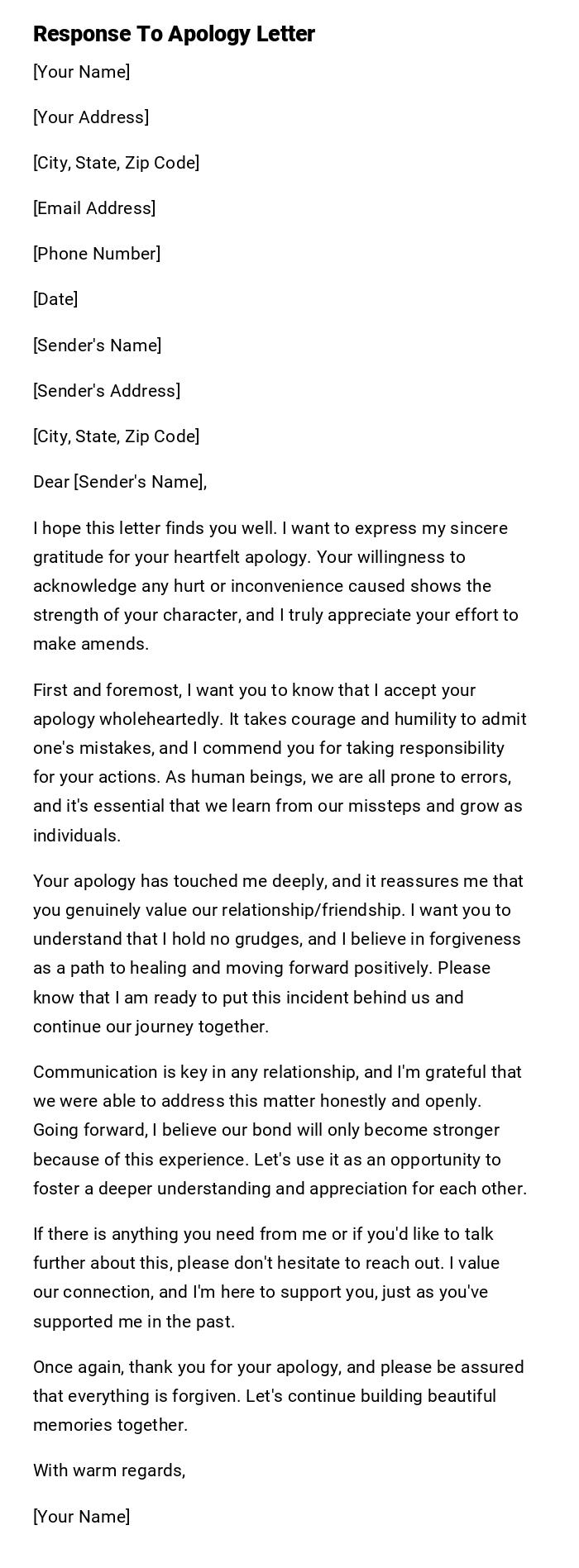
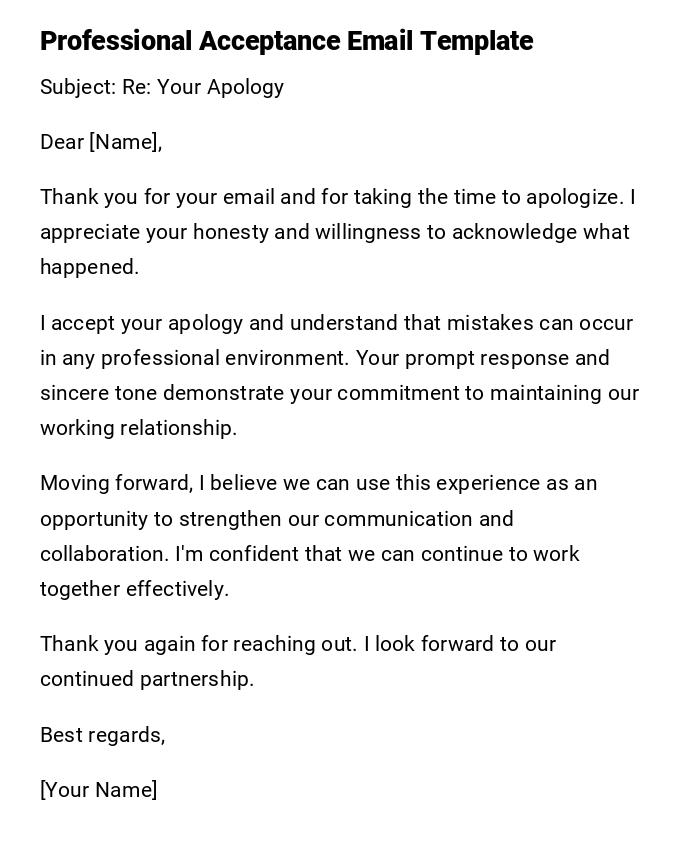
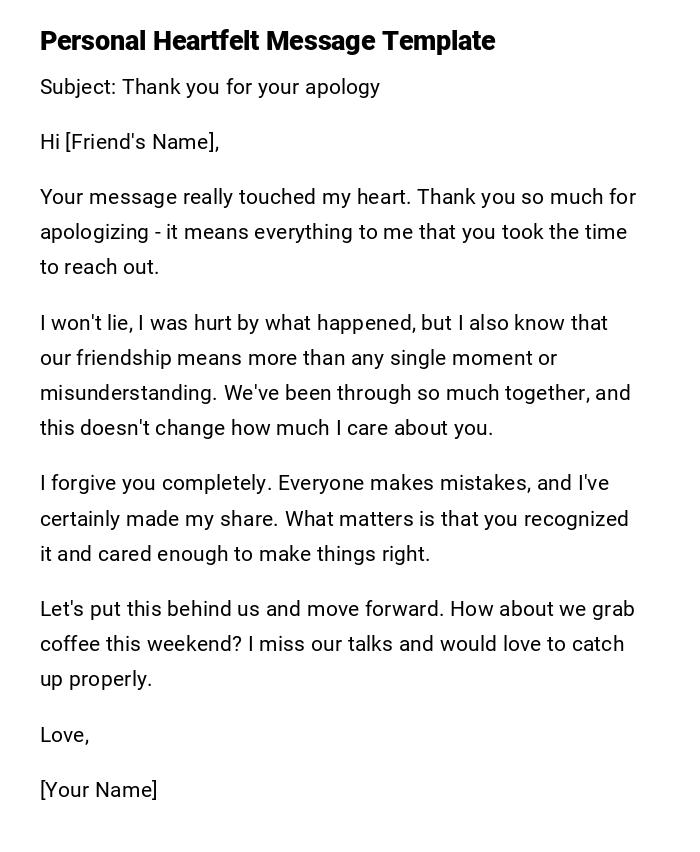
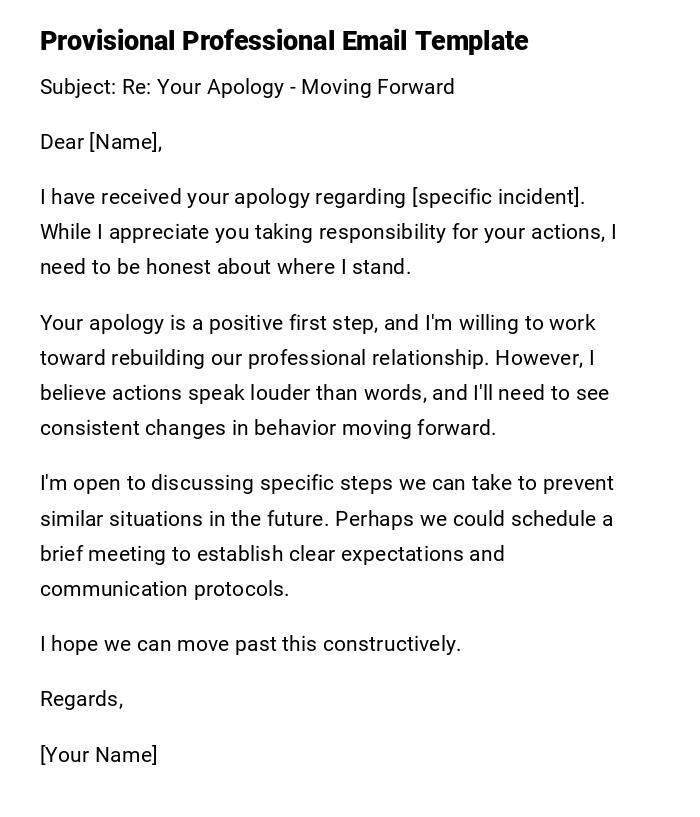
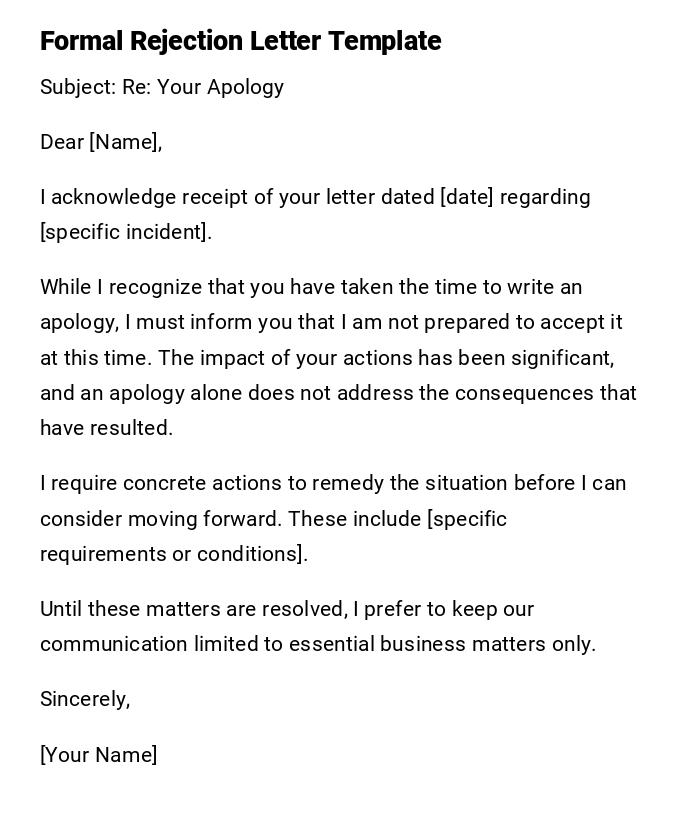
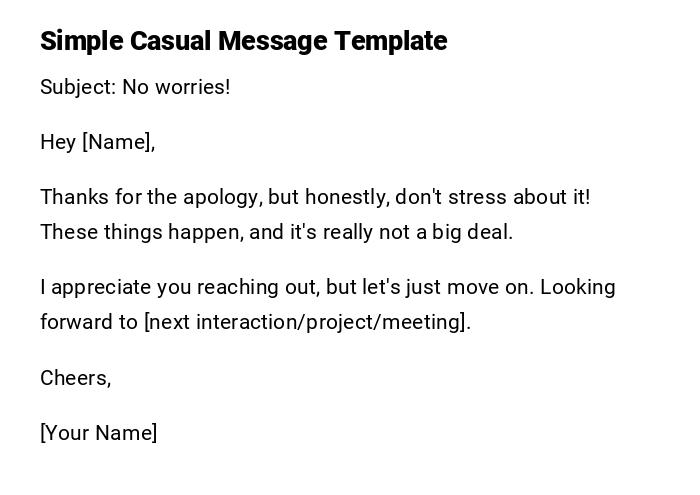
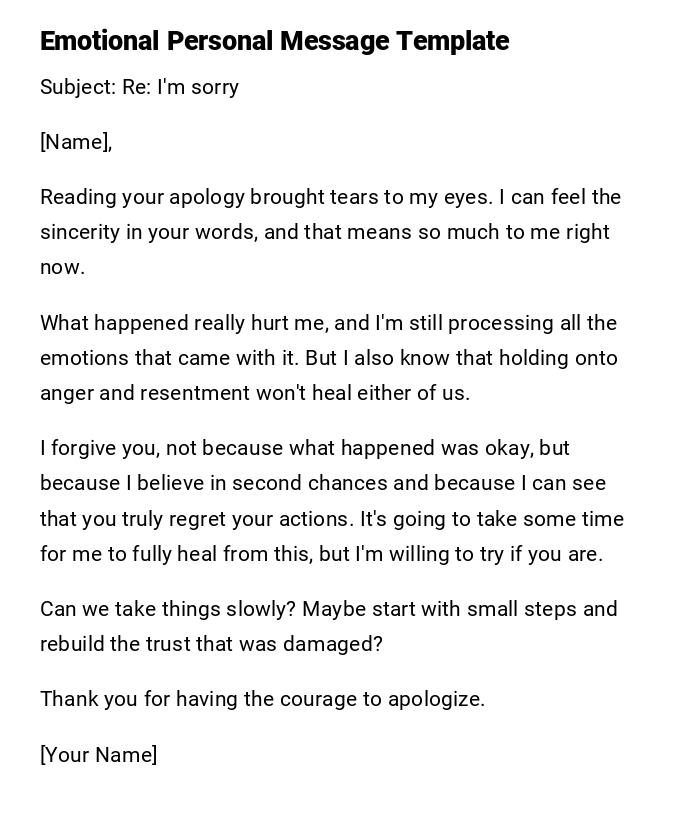
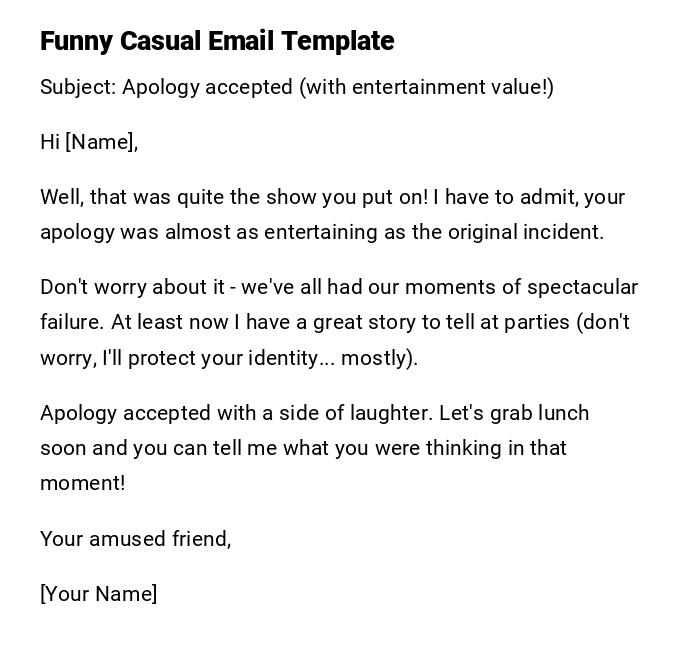
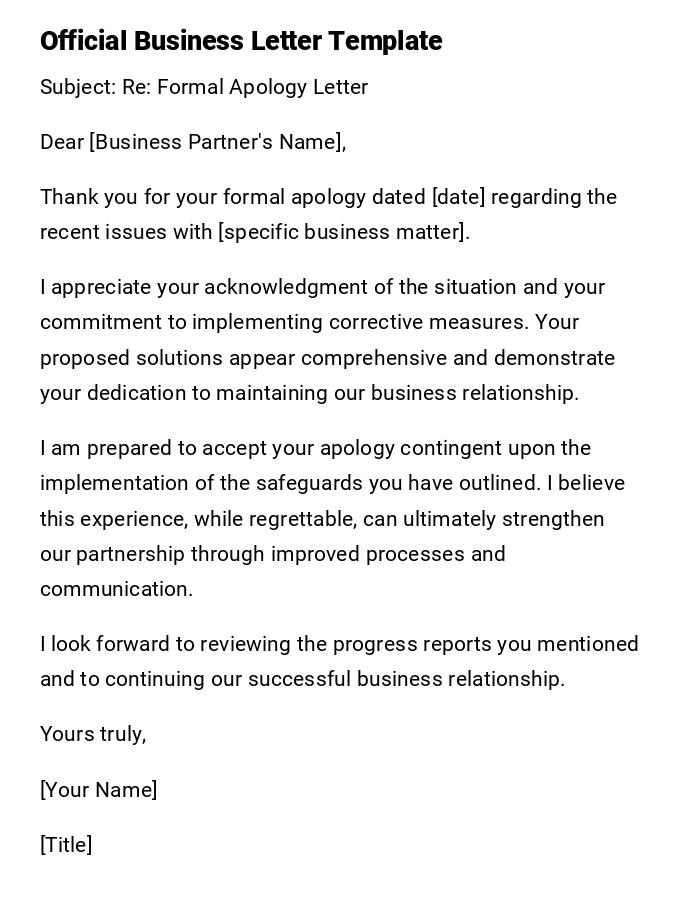

 Download Word Doc
Download Word Doc
 Download PDF
Download PDF